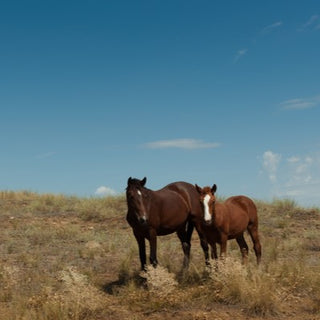How to Feed a Mustang Horse
Feeding a mustang, America's wild horse, differs significantly from feeding domesticated horses. Whether you are a past mustang owner or a new one, understanding your newly adopted mustang's unique dietary requirements is essential for its health, temperament, and well-being. This blog post will guide you through the intricacies of mustang nutrition and help you make well-informed decisions on how to feed your newly adopted mustang.
Understanding the Mustang
The mustang horse, a breed that evolved to live in the wild, has dietary needs that differ from those of domestic horses. Mustangs have survived and thrived on sparse grazing, and their diet primarily consisted of grass. Consequently, mustangs get most of their nutrients from grass hay, a key component in the diet of a domesticated mustang.
The Role of Grass Hay in a Mustang's Diet
Research has shown that feeding a mustang a ration that closely mimics its natural diet would be ideal. Therefore, grass hay should form the backbone of your mustang's diet. An equine nutrition expert would also suggest a small amount of alfalfa for its high nutrient content. However, be careful to maintain a balance as too much alfalfa can lead to health issues.
A newly adopted mustang is often a wild horse gentled for adoption. As you domesticate the mustang, the change in diet needs to be gradual. Your horse's gut flora needs time to adapt to new feed, so start by offering small amounts of grass hay.
Mustang Horse Care: Pasture and Pellets
The Bureau of Land Management (BLM), who manages herd management areas for America’s wild horses and burros, recommends allowing mustangs to graze in a pasture. Providing a safe pasture environment allows the horse to maintain its easy-keeping nature and offers hoof benefits through constant movement.
The Use of Pellets and Vitamins and Minerals
While grass hay or pasture (forage) should be the main component of your mustang's diet, it's always a good idea to feed a mineral balancer pellet, especially if the hay quality is not optimal. These pellets are fortified with necessary vitamins and minerals, essential for a horse’s overall health. Mustang horses are generally very easy keepers and feeding grain is unnecessary.
Avoiding Colic in Your Newly Adopted Mustang
Colic is a common condition in horses and can be triggered by sudden changes in diet. When transitioning your mustang from a wild diet to a domestic one, remember to take it slow. The transition from wild to domestic life can impact a mustang's temperament. Be observant and notice any changes in behavior, which might indicate discomfort or stress related to dietary changes.


Tammy Lundervold
I just adopted a yearling Mustang from BLM. I have him on grass hay and 1/2 flake of alfalfa and white and mineral salt block. I would like suggestions for a bit and mineral supplement, we need to add selenium in the NW. the formulated balancer seem to have to much sugar. Although, enrich is one many people feed with good results for domestic yearlings. Thoughts?
Melyni Worth
If you have specific questions, please email me directly. All of our consultations are free, so please don’t hesitate. Our website does not allow us to reply to blog comments!
Maria
What specific minerals do you give a Mustang. And how much and how often? I’m new to them and soon I will have two Mustang to care for and I want to do what is best for them.
Kim calihan
I have a 5 year old mustang gelding I have had him two months and unsure what to feed him for optimal nutrition.. I have had domestic horses before so unsure the requirements needed..